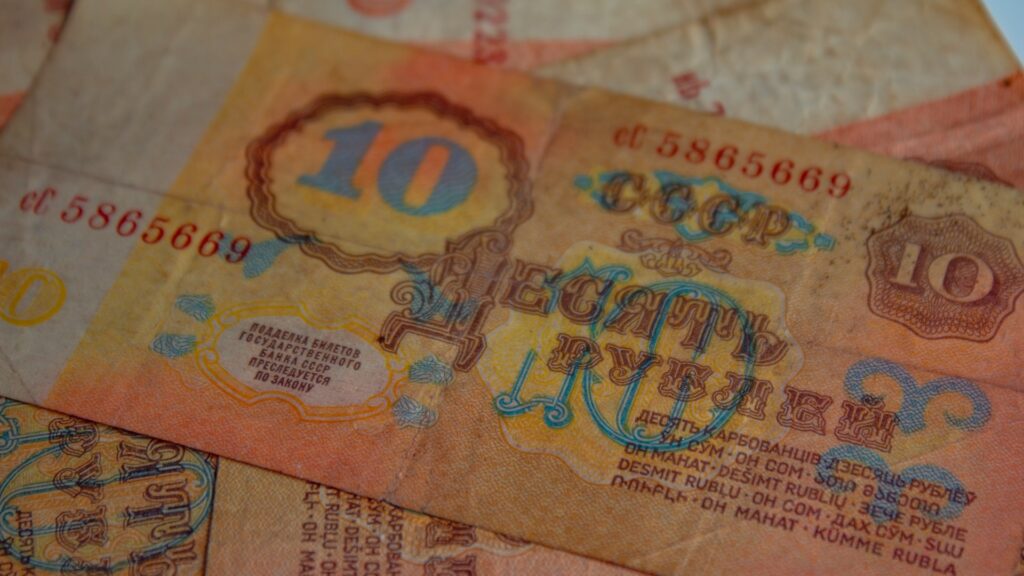Sanctions against Russia after the attack on Ukraine initially worked very hard and effectively, sinking the Russian ruble to an all-time low. It went from 75 to 140 rubles to the dollar. However, subsequently, the rate corrected to below 70 dollars because of the central bank’s interventions.
That is to say, to stronger values than it was when Russia attacked Ukraine. In recent days, however, the strengthening has continued. The ruble has even firmed below 61 rubles to the dollar, its strongest exchange rate in two years. The ruble is even the strongest against the euro in five years.
Bloomberg reports that the ruble is even performing the best of all the world’s currencies. It has strengthened by 14% against the dollar since the beginning of the year, surpassing even the rapidly appreciating Brazilian real.
How is this possible?
Soon after the ruble’s initial depreciation, the Russian central bank drastically increased its benchmark interest rate from 9.5 to 20 percent in an attempt to prevent capital outflows from the country. Consequently, it has forced exporters to convert their foreign exchange earnings into rubles and restricted the ability to buy foreign currencies.
In addition, demand for foreign currencies has also fallen, as several foreign companies have ceased their activities in Russia and stopped exporting their goods there.

This reminds us a little of the official exchange rate of the Czechoslovak koruna before 1989. The latter also claimed that the koruna was strong against foreign currencies. However, it was not, and therefore a secondary market of bills was created where the koruna was much weaker.
The strengthening of the ruble was not only prestigious for the economy but, most importantly, necessary to prevent hyperinflation. If the ruble had remained at 140 rubles to the dollar, the inflation would have been astronomical. Already the Russians have high inflation.
Russia’s annual consumer price growth accelerated to 17.8 percent in April from 16.7 percent in March. Thus, the inflation rate has been the highest since January 2002. Meanwhile, the Central Bank’s target is four percent. However, the growth of the inflation rate does not stop there. The Central Bank itself expects inflation to jump to 18 to 23 percent. That is a lot, though; we expected more from the unprecedented sanctions against Russia.
The sanction pressure on the ruble has led to some interesting thoughts. The possibility of pegging the ruble to gold and other commodities has reportedly been discussed in the Kremlin. The gold standard has served as an excellent tool to fight inflation in the past. At first sight, it might seem like a spectacular solution.
Nevertheless, it has been outdated in the modern world. Most money in the modern economy is not created in the central bank but rather endogenously in the lending process of commercial banks. Pegging the currency to gold would thus result in the undercutting of economic growth.
Be warned, it is not just the manipulated market that speaks in favor of the ruble, but hard macroeconomic data as well. The Russian current account balance of payments surplus reached $95.8 billion in the first four months of this year. Meanwhile, the Russian Central Bank said the surplus was only $27.5 billion in the same period last year.
So how sanctions can become harder on Russia?
The record Russian current account surplus on the balance of payments makes us think that the West has taken sanctions against Russia the wrong way round. The goal, indeed, wasn’t to increase the surplus.
The aim should have been the deficit and the currency plunge. The surplus is at a record high because the West is speculating that Europe will ban imports of Russian commodities as part of the sanctions. This sounds good but has its BUTs.
Many countries can’t ban Russian oil and gas imports in the short term. Oil and gas prices, though, react immediately. The European discussion on sanctions has catapulted commodity prices. Eventually, oil and gas have to be bought by Europe anyway.
However, the outcome is not to Russia’s detriment but the opposite. It will sell fewer commodities, but it will sell them for more money. The war in Ukraine can therefore continue. Two jumpers in a freezing flat are consequently not the solution.
On the contrary, the West should seek to reduce commodity prices if it wants to damage Russia seriously. That can only be achieved by a dramatic fall in demand, which would be devastating for the European industry, so supply must be increased instead. Europe needs a surplus of oil and gas in the next two or three years.
During those years, Europe could rapidly build new pipelines (without all the procedures and permits) and can then stop importing Russian commodities. By doing so, Europe will not destroy its economy but the Russian one. The result of what we are doing now is that Russia suffers, but it suffers little. Whoever thinks that Russia will end its aggressive policy because of these sanctions is mistaken. The sanctions are toothless.
But how to reduce commodity prices? Here there is room for diplomacy. Europe should simply put, encourage some commodity-producing countries by paying them to produce more and lower their selling prices.
In other words, what Europe will pay for is expensive energy anyway. However, it is now paying Russia; it would be paying someone else. War in Ukraine will cost us in all circumstances, but we are prolonging the war in one case, and in the other, we are shortening it.
Also Read: